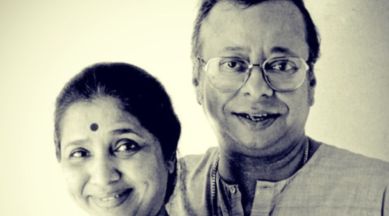Click here to follow Screen Digital on YouTube and stay updated with the latest from the world of cinema.

The love story between the renowned singer Asha Bhosle and the legendary music producer and composer RD Burman is a tale that remains timeless. Bhosle’s journey, from embracing Burman’s love to accepting that he couldn’t conform to the societal expectations of a traditional husband, is a testament to their deep bond.
Bhosle, in an interview to DNA, recalled her first encounter with the young and talented Burman, affectionately known as Pancham. The memory etched in her mind portrayed him as a thin, pale boy waring thick glasses. “The boy asked me for my autograph, said he’d heard my Marathi natya sangeet on the radio,” she added.
As their friendship flourished, Bhosle noticed that Burman had dropped out of college in Kolkata. Concerned about his future, she urged him to complete his graduation, sparking a momentary sulking episode during a recording session. She said, “He’d dropped out of college in Kolkata. I told him he should have completed his graduation. He sulked with me for the rest of the recording.”
Son of the iconic composer SD Burman, Pancham revolutionised Hindi film music after debuting with comedian Mehmood’s 1961 movie Chhote Nawab. From the catchy ‘Aaja aaja, main hun pyaar tera’ to the soulful thumri “Hame tumse pyar kitna” to the naughty “Ek chatur naar” and the melodious “Naam ghum jayega”, RD Burman’s range was amazing and he left a lasting impression n Hindi film music.
In 1966, Burman tied the knot with Rita Patel, but their marriage came to an end in 1971. In 1980, the musician tied the knot with Bhosle. The veteran singer had fondly recalled Burman’s comedic nature, highlighting an incident where he gifted her a wrapped broomstick and a rose. She said that wit and talent for mimicry (the one where he wore afro-jack wigs) also left a lasting impression on her.
However, Bhosle, talking about Burman’s life, expressed that his deep connection to music often overshadowed other aspects of his existence, such as being a husband or a son as prescribed by societal norms.
She said in an interview with Girija Rajendran, “For instance, he would be happy to sleep on the floor, but his recording system, his stereo, must be immaculately kept. He doesn’t care for what he eats, because he lives, eats and sleeps music. So, once I discovered the real man, I became less fretful. You can never find a gentler or more caring husband, once you leave him in peace with his music. Life with Pancham is absolutely serene, now that I have realized I should not try to force this wonderful talent into a society-slotted role.”
Together as a team, Bhosle and Burman created an extraordinary musical legacy. Over a span of more than 25 years, their collaborative work stood out and according to Asha, he brought out the best in her.
She said, “OP Nayyar exploited my quality as a bass singer. Shanker-Jaikishen tested my singing quality only as it already stood. It is only Pancham who has uncovered my range as a singer. Till Pancham made me to explore the inner recesses of my own voice – from ‘low pancham’ to ‘high pancham’ – I was totally unaware of the fact that I could sing with such suppleness of throat.”
Reflecting on their final moments together, Bhosle revealed that Burman seemed snappy during their last conversation, revealing his plans to visit Khandala. As she recounted the heart-wrenching memory, Bhosle revealed that during Burman’s final moments, he attempted to convey his pain, muttering the words, “Bahut dukhta hai.” She said, “He was also trying to take my name, ‘Aa..aa..’ but couldn’t complete the word.” Bhosle expressed her belief that if Burman had been able to overcome his drinking habit, he would have survived. Burman died on January 4, 1994 in Mumbai at the age of 54.
Click here to follow Screen Digital on YouTube and stay updated with the latest from the world of cinema.